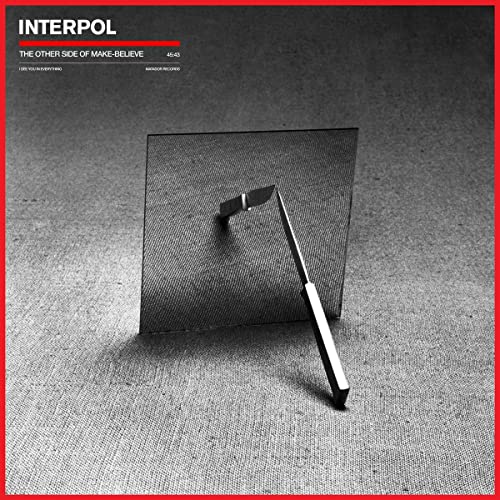
Interpol
The Other Side of Make-Believe
Release Date: Jul 15, 2022
Genre(s): Pop/Rock
Record label: Matador
Music Critic Score
How the Music Critic Score works
Buy The Other Side of Make-Believe from Amazon
Album Review: The Other Side of Make-Believe by Interpol
Great, Based on 7 Critics
Based on rating 4.5/5
The aim now is perfection always In spite of its flaws, I would say I enjoyed Marauder more than most at the time. Nevertheless, there were a couple of capricious decisions made by the band that even I struggled getting my head around. Essentially Marauder was an attempt at exploring new pastures, stripping down their sound to its bare, vulnerable functions; removing the chic bodywork in order to bestow the band's chassis and all of its working parts to the listener.
Based on rating 4
Two decades on from their debut Turn On The Bright Lights comes this dependably great album from a dependably great band Interpol, now 20 years removed from their stunning debut Turn On The Bright Lights, have returned with a puzzling and surprisingly difficult album, but not in the way you might expect. The Other Side Of Make-Believe is Interpol's seventh studio album, and it comes in the wake of one of their most interesting releases ever (2019's raw, bloody and noisy EP, A Fine Mess). The band have diligently put forth into the universe that this album is intended to be uplifting, and carry optimistic lyrical themes – which is a direct contrast to what they've spent the last 20 years doing.
Based on rating 7/10
During the making of Interpol's seventh album, The Other Side of Make Believe, lead vocalist Paul Banks was grounded for nine months in the Scottish capital, Edinburgh due to the pandemic lockdown. No, thankfully there's not any bagpipes that have made the cut or any reference to kilts in the lyrics. The LP was, as in most recent cases, conceived remotely across various locations during 2020, refined in New York state's Catskills, and finally completed in north London.
Based on rating 7/10
Though while their offerings tended to lie in the murky undergrounds and alleys with dubious characters straight from the life and mind of vocalist and guitarist Paul Banks, over their career they've emerged as studious proprietors of the 'Interpol' sound, which can be whittled down to darting guitars, rattling drums and Banks' inimitable vocals. The bending and breaking of these components has led to this, their seventh album. The Other Side of Make Believe comes toting an Interpol we're yet to see but still with all the same clicking cogs that first enraptured us.
Based on rating 6/10
For more than a decade, Interpol have been stuck in a sort of medium mood. Unable to live up to the hype of their classic debut, 2002's Turn On the Bright Lights, they've retreated into a safe midtempo zone, content with simply updating their post-punk recipe. Although more satisfying than 2018's Marauder, their seventh LP The Other Side of Make-Believe does very little to shake the impression of a band whose glory days are way behind. It's not like they aren't trying.
Opinion: Excellent
The late career resurgence of Interpol has produced some of the boldest, most uncompromising work of their career. 2010's self-titled may not have been appreciated at the time, but that record – which saw the band resume their relationship with Matador, while losing bass player Carlos D – marked the beginning of a new chapter, with 2014's 'El Pintor' and (particularly) 2018's 'Marauder' winning excellent reviews , thanks to their ragged songwriting and beautifully executed atmospherics. 'The Other Side Of Make-Believe' continues this arc, and it could well represent the New York band's finest music since their debut album.
Opinion: Fairly Good
For 20 years, NYC's Interpol have searched for ways to alter the shade of their monochromatic, elegiac rock: a dignified, if not always successful pursuit. This lightly envelope-pushing seventh album finds that elusive new sweet spot in bringing to the fore a somewhat alien concept: hope. With the help of super producer Flood, the band used lockdown distance to change up their jam-the-songs-out approach, letting some light through the cracks.
'The Other Side of Make-Believe'
is available now

